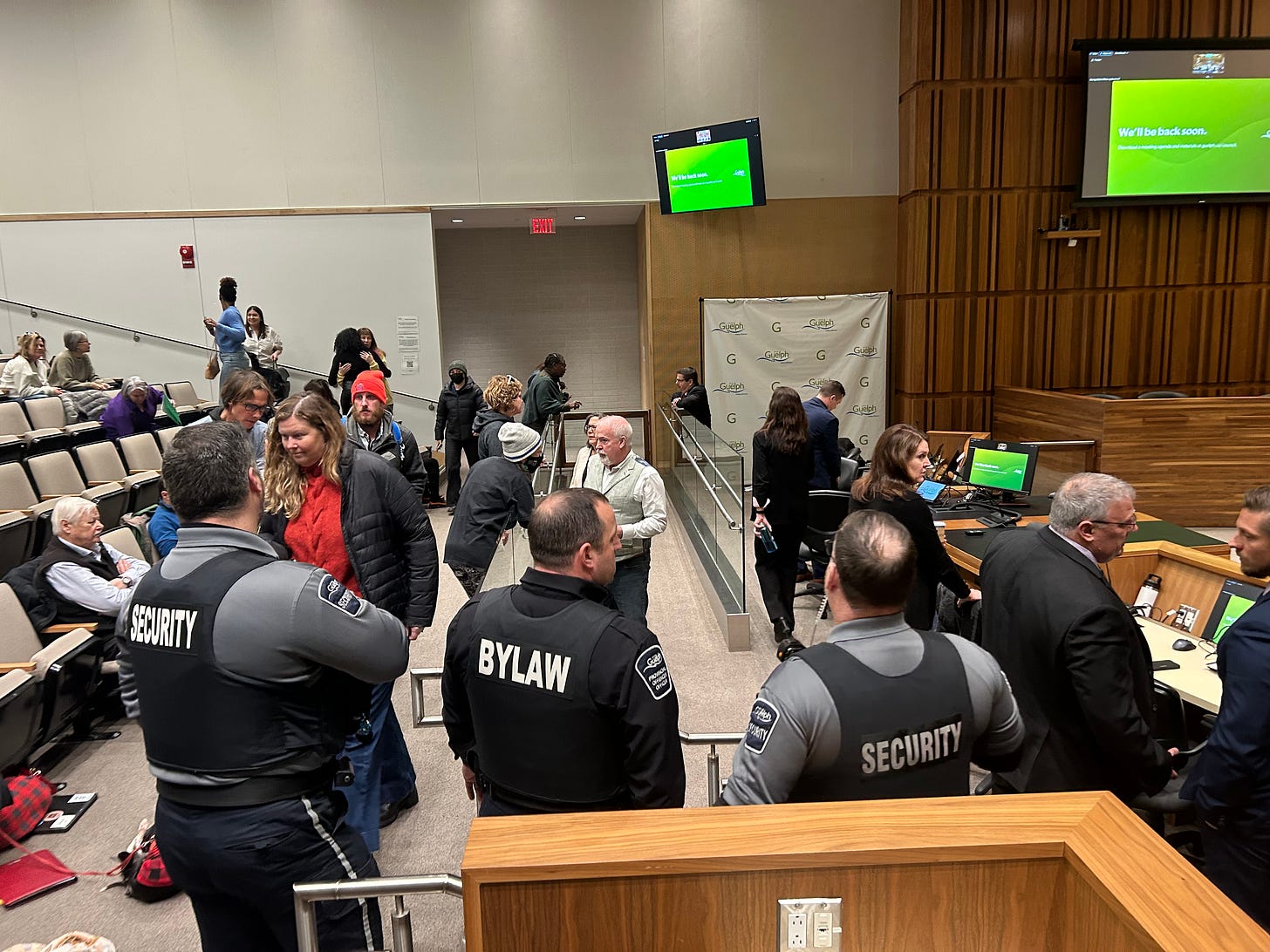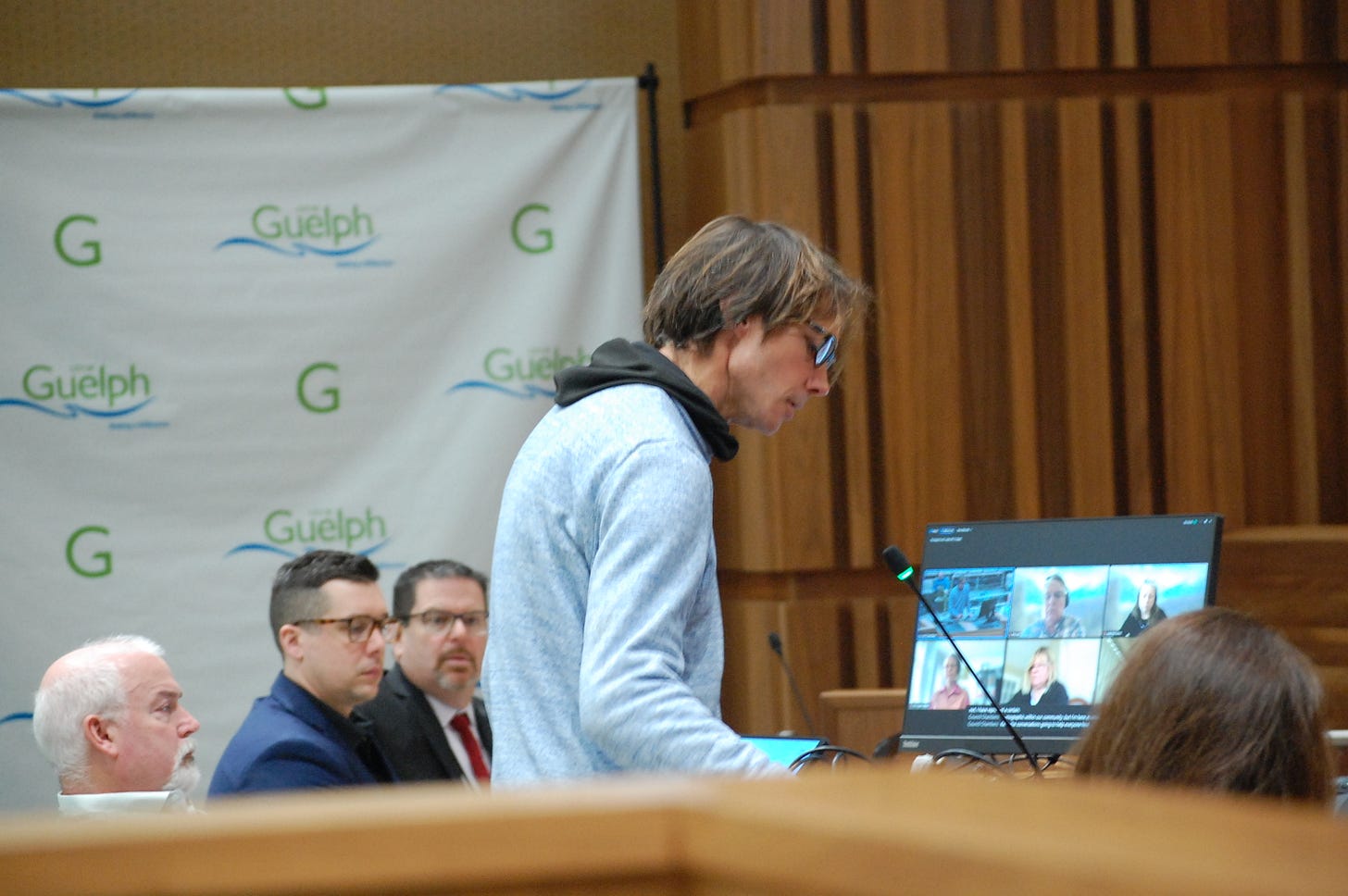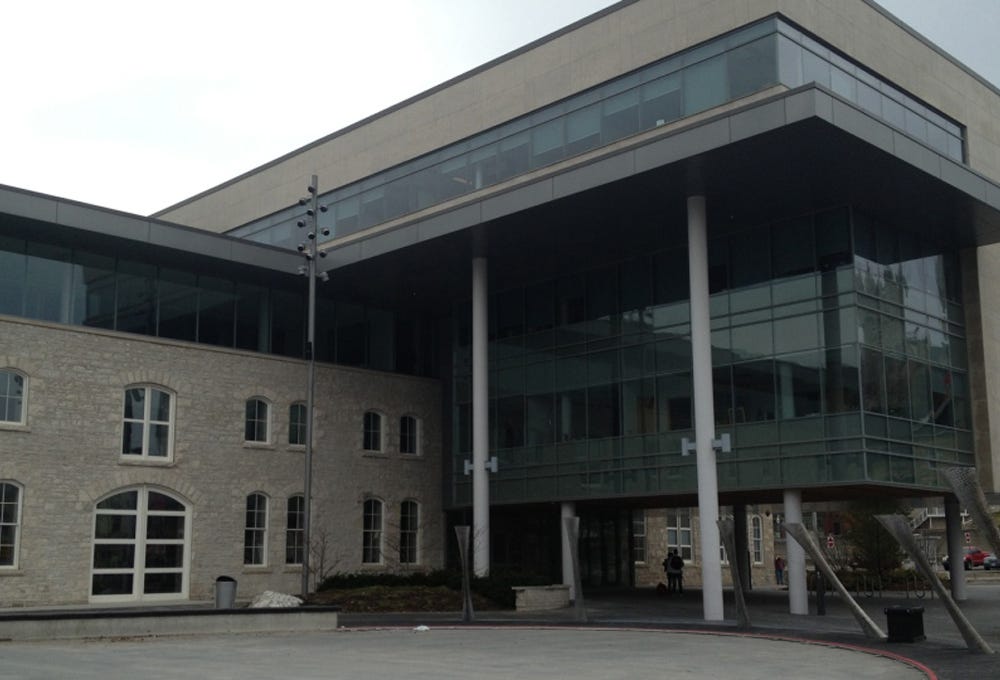Council Recap: Shelter From the Scorn
Encampments get a reprieve as council plays wait and see with courts.
In this irregular Thursday edition of the Guelph Politico Tip Sheet, we will go in-depth with the debates and decisions about this week’s city council meetings. Your regularly scheduled Tip Sheet will be in your inbox first thing Friday morning!
Planning Meeting of Council – February 13
The business of council was fairly straightforward at this month's planning meeting with a project at 14 Stevenson Street North approved quite swiftly followed by the York-Elizabeth Land Use Study amendment to the Official Plan. There were no delegates interested in talking about staff efforts to hold on to employment lands while maximizing potential residential development in areas along to Victoria Road and Elizabeth Street in the east end.
There was however some community interest in the Decision Report for 1563-1576 Gordon Street; 42 & 48 Lowes Road West and 164-182 Dawn Avenue and its 150 stacked townhouse units across six blocks, plus eight single detached units fronting onto Dawn. Staff wanted council to approve the project, and three delegates who lived in the area didn’t disagree, but they did have concerns about how much density has come to their area and whether issues around access and drainage were being addressed by both the developer and City staff.
Council acknowledged that there have been repeated concerns about flooding in the area; when it rains hard the water essentially has nowhere to go and City crews are frequently required to go in and manually pump out the water. The planner for the development offered assurances that they have a drainage plan that will catch the stormwater with an infiltration plan from the majority of the site, the only exception is an area on the southern edge, but the stormwater there should drain into a natural heritage feature. The recommendation was eventually approved unanimously.
After that, council heard two objections to heritage designations, one for the old Hanlon farmhouse at 331 Clair Road East, and the other for the Kidd barn and the Blair farmhouse at 2187 Gordon Street. Interestingly, the property owners who brought the objection did not designate, but James Hanlon’s great, great granddaughter did along with presentations from heritage planning staff and members of Heritage Guelph. In the end, council was easily convinced that they made the right call to designate both properties and the objections were overruled.
Click here to see the complete recap of the meeting.
Special Meeting #1 of City Council – February 14
You might as well have popped a tent in the council chambers because it was an all-day affair. It started even earlier for some, a group of community activists protested the proposed Public Space Use Bylaw during rush hour, but at 10 am the action moved over to City Hall for the start of what was going to be a long and contentious meeting.
DCAO Colleen Clack-Bush explained that the intent of the bylaw was to help make public spaces owned and operated by the City of Guelph available for everyone, to ensure designated and sensitive spaces are used for their intended purposes, and to accommodate the needs of unsheltered individuals so that they can live safer with dignity and stability. She also explained that staff put it together in 11 days, which meant circumventing the usual public engagement processes.
Staff aimed to balance competing needs by making sure that designated spaces are being used for their intended purposes and that everyone can enjoy public space. They also wanted to make sure that this was permissive, and to make it clear that there are safe locales through the city for tents. Places with no competing use would allow tents 24/7, while other locations would only allow tents overnight. Select locations would not allow tents any time if they’re deemed sensitive like playgrounds, splash pads or were near vital water resources.
The bylaw only applies to City of Guelph property (though it may end up applying to other properties in the future), and the bylaw was careful crafted around court decisions in Kitchener and Kingston, plus the encampment protocols used in Hamilton. The bylaw would go into effect March 1, but City staff would undertake an education-first approach, meaning no one would get evicted that first day.
Clack-Bush laid out the issue using the Two Moms (a true story). Mom #1 worked with her child’s kindergarten class, and they planned an end of year trip to a local park where they booked a pavilion. When they get to the park, they found someone seeking shelter there. Without the new bylaw, the City doesn’t have the tools to make that person move along. Mom #2 came to Guelph and set up camp in a park because her child needed care and she couldn't afford to stay in a hotel. The City was inundated with calls, so the bylaw needs to be clear that this person should be left alone if they’re not doing anything wrong, and they’re using the park respectfully.
Despite the long list of delegates, Guthrie went first to council questions, many of them were around getting feedback from people with lived experience, how the bylaw will be enforced, the lack of accommodation for people with accessibility needs, and how this work interfaces with the recent Health and Housing Symposium. There were also some questions about waiting until the legal situation in Kingston and Tuesday’s report that called homeless encampments a “national human rights crisis.” In response to many of these questions, staff noted that they were doing what council told them to do in the timeline they were told to do it in.
Although there were 40-some people signed up to delegate not everyone made it, and some people had to leave to go to work since it took nearly four hours to get through all the delegates with a lunch break in the middle. But the delegations were almost over before they started because many of the first-timers drawn to this council meeting were feisty, and thus not explicitly holding up the rules of decorum. When Mayor Cam Guthrie pointed this out someone yelled "What's violating decorum?" which promoted Guthrie to direct security to start throwing people out. Then all hell broke loose.
Guthrie and council left the room but came back a few minutes later. Guthrie, a bit calmer, explained what he meant by decorum and how the council chambers need to be a place where everyone can have differences respectfully. With everyone calmer, the delegations continued.
One of the most interesting delegations was Anthea Millikin, the executive director of the Guelph Wellington Legal Clinic who explained that in Kitchener and Kingston it was the local legal clinics that lead the court challenge, and she foresaw something similar happening in Guelph if the proposed bylaw was approved. She asked why Guelph wants to put itself in a situation where they'll have to go to court to defend this, especially since Millikin read the draft bylaw and she still had no idea what was permissible and what wasn’t.
There was a lot of objection overall to the proposed bylaw with a couple of downtown business owners and a heritage advocate among the ones most in favour. A solicitor from Wellington County also appeared and said that she would like to see County property also covered in the caveats of this bylaw. Of course, many are familiar with Greg Droval, a man who’s been advocating for action on homelessness by pitching a tent behind the County Administration Centre on Woolwich. Dorval left the council chambers in protest when Acqua Salon proprietor Pina Marfisi was delegating about the perceived negative impact of encampments in St. George’s Square.
There was a lot more of that emotion as the afternoon wore on, especially as the City heard from activists who work with people experiencing homelessness in Guelph. Susan Watson took a few shots at Guthrie over Strong Mayor Powers, others took shots at council for not doing more to fight the issue in local policy, and Daniel Loughrin from Upbeat Guitar Studio said that as a downtown business owner he had no problems with anyone living across the street from him in a tent.
We were well past 3 o’clock at this point, and council decided to go in-camera to receive solicitors advise. This took us right up to 5 pm, and at that point this council meeting would have to stop so that they could start another entirely separate meeting (see below). Guthrie explained that council only received advise in-camera and did not give any direction.
After the tribunal, council went back to the well for the Public Space Use Bylaw, which, itself, was deferred by council until the legal situation around the City of Kingston’s appeal of a court decision on their bylaw is resolved. Council did approve the two remaining recommendations, one to get monthly statistics on homelessness from the County and one to advocate through AMO to the provincial government, though that was amended to include the federal government too.
In additional motions, council passed a recommendation to give people in encampments some fire prevention education. They also took several swings to find the right wording for a motion to direct staff to start public engagement about the use of public spaces for shelter. Some on council had doubts about sending staff on this course before a final determination is made in the courts, but it was noted that the data gathered could be useful for a developing any future policy around people living rough. Clack-Bush said that this was direction that staff could work with, and council approved it.
Guthrie wrapped up the meeting by saying that despite some commentary from delegates, the City had done quite a bit on homelessness: they limited short-term rentals, advocated to not allow appeals on supportive housing, gave millions more to the County, built 108 new supportive, and created an encampment team and funded it with $100,000. Clack-Bush said on that last point that they’re on track to have spent that money and bring a report back to council in June. Also, there will be a third, more public-facing day for the Health and Housing Symposium in April.
Click here to see the complete recap of the meeting.
Special Meeting #2 of City Council – February 14
Due to a fluke of scheduling, council had to put the meeting on the public space use bylaw on pause to meet as a tribunal under the Development Charges Act. At issue is a misapplication of DCs collected for building C of the development at Paisley and Whitelaw. The developer says that there was an understanding that the City would apply an overpayment for buildings A and B to building C using the 2019 DC rates, but the City applied the pricier 2022 rates instead.
After a brief orientation about how this whole tribunal thing was going to work, council heard from the developer’s lawyer and from one of the City’s solicitors. As Jennifer Meader explained, there was, in her clients’ opinion, a valid agreement for a pre-payment of DCs in 2019; building A was built in 2019 and even though building B wasn’t started till 2022, the DCs were still applied at the 2019 rates. There was about $800,000 left over from the pre-payment and the developer understood that these funds would cover building C using the 2019 DCs and that didn’t happen, plus the City pocketed the interest.
Allison Thornton, associate solicitor for the City, disagreed on some of those details. She explained that buildings A and B were both priced in with the 2019 DCs because they were part of the same phase, and there was never any formal pre-payment agreement to begin with because the language used back and fourth in email correspondences was “vague” and council has to approve those kinds of deals under the Act in any case. Thornton added that there was no funny business with the interest accrued either, it was all accounted for in the final calculation.
There was some back and forth from the councillors as they tried to make sure that they had a handle on the situation, and eventually they went into closed session to reach a decision. After about an hour of deliberations, Mayor Guthrie told the parties that the tribunal had reserved their decision, and it will be delivered in writing to all involved. The result of that decision, whether they dismissed the complaint or rectified any incorrect determination or error, is not known to anyone that wasn’t in the closed meeting room.
Click here to see the complete recap of the meeting.
The next meeting of city council will be the planning meeting on Wednesday February 21 as council takes part in the KAIROS Blanket Exercise, which will take place in-camera so there won’t be any delegations. See the Politico preview here.
For more information on Guelph City Council meetings, from agendas to live-tweets to recaps, you can visit that page on Guelph Politico here.
Finally, feel free to reach out to me by email at adamadonaldson [at] gmail [dot] com, or find me on Facebook, Twitter, and, of course, GuelphPolitico.ca!







